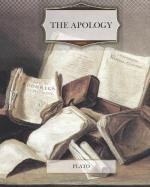|
|
The Apology The Defense (Section 1)
The proper thing for Socrates to do, in his opinion, is to defend himself from his accusers chronologically. This is because there have been many of them for many years, despite the fact that none of them have ever said a word of truth. The most amazing accusers, however, are those that made the untrue accusations of him in front of, and to, children. They accused him of saying that he had theories about the earth and heavens, and did not believe in the gods. Furthermore, they continued to say that he "'can make the weaker argument defeat the stronger.'" Line 18c. Socrates considered these people to be his most dangerous accusers because they influenced children from a very early age when they are most impressionable, and because there was nobody there to defend him. He deems it impossible to know, or name, all of his accusers, and thus he says that it is very difficult to deal with them or cross-examine them all. Because of this, "one simply has to conduct one's defense and argue one's case against an invisible opponent...." Line 18d Socrates believes that his critics fall into two classes: those who directly accused him; and those mentioned previously, the latter whom he will defend himself against first.
After this introduction, Socrates begins his defense, aiming to convince the jury that the impressions that they have of him are false. However, he realizes that this task is difficult and will thus go back to the beginning and examine the factors that have made people so critical of him, and have caused them to attack his character, and eventually Meletus to draw up this indictment. The primary accusations were that he was a physical philosopher, a sophist, and a professional teacher. He was depicted, in Aristophanes' play, as someone who was lifted around, "proclaiming that he is walking on air, and uttering a great deal of other nonsense about things of which I know nothing whatsoever." Line 19c He now asks the members of the jury to stand witness to his statement that these claims are false, and tell each other whether they have ever heard him speak of such things. By proving that there is little truth in this statement, he believes that they will realize that there is little truth in the others as well.
Socrates claims that just as there is no truth in these charges, there is also no truth that he tried to educate people for a fee. However, he claims that it is truly something to be proud of if a man does have this ability, such as Gorgias of Liontini, Prodicus of Ceos and Hippias of Elis. He says that each of these people are capable of convincing anyone that they are better off paying for their company than spending time with their friends. In meeting Callias, Hipponicus's son, who pays more in sophist's fees than anybody else, Socrates asked him who the best teacher in perfecting societal virtues is, and who he would hire to teach his sons these things, if there is such a person. Callias answered him that of course there is such a person, and that Evenus of Paros was the best at doing this, and charged 500 Drachmae. Socrates felt that Evenus should be congratulated if he truly was a master at these things, and that it was surprising that he should charge such a moderate fee. Now, he continues to say that he would certainly be a proud gentleman if he had his understandings, but he does not.
To answer the unasked question of how such a reputation befell him if he had engaged only in regular activities, Socrates says he will give whole truth. He gained this reputation from human wisdom.
Furthermore, he believes that the geniuses he just mentioned have a wisdom that is more than human, as he does not know how to account for it, and he knows he does not have it. Thus anyone who says he does must be lying.
Although this may sound extravagant, he calls as his witness, Delphi. When Chaerophon, his friend from childhood and an excellent democrat, visited Delphi and asked the god if there was anyone wiser than Socrates. The Delphi answered that there was not.
When Socrates heard this claim, he asked himself what hidden meaning the god had because he was only too aware that he is not wise, let alone the wisest man in the world. However, as gods cannot lie, he set out to find out what the god meant.




